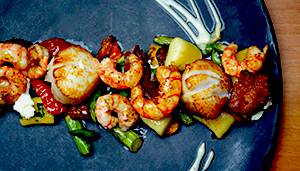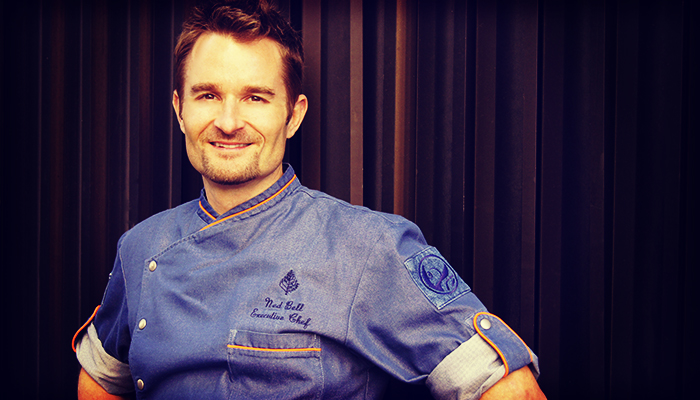
Executive chef Ned Bell, of Vancouver’s Yew Restaurant, the Forbes Travel Guide Four-Star dining room at the Five-Star Four Seasons Hotel Vancouver, recently completed a 72-day, 5,400-mile bicycle trip from St. John’s, Newfoundland, across the country to his British Columbia home. And he did it for the fish. Founder of Chefs for Oceans, Bell conceived his ride as a way to raise awareness and funds in support of sustainable seafood. Bell sat down with Forbes Travel Guide to talk about his adventure, what led him to this cause and the fish he’s now serving on his restaurant menu.
The Goal
“Chefs have a unique responsibility to know where their food comes from,” Bell says, a responsibility he feels particularly strongly about as the manager of a busy dining room in a large city-center property. “Hotels are a big bad wolf. We consume a lot, and we have to think about how we are going to feed all the people in the future.”
Bell was born in British Columbia’s agricultural Okanagan Valley and raised on the seafood-centric west coast. After training with several top Vancouver chefs, including Michel Jacob at Le Crocodile and Rob Feenie at (now-shuttered) Lumière, and cooking at numerous independent restaurants, he took his position with the Four Seasons several years ago. There, he began working on ways to encourage people, particularly other chefs, to think about sustainability.
He says he “feels fortunate to have a soapbox to help spread the message” of conscious consuming. Under Bell’s leadership, the Four Seasons Vancouver became Canada’s first 100 percent “Ocean Wise” luxury hotel, serving only sustainable seafood species in all its food service operations.
The Ride
But why travel across Canada on a bike? Bell says that the idea for the cycling adventure came from conversations he had with Canadian Olympic triathlete Simon Whitfield about setting an ambitious goal and using the resulting platform to support something you believe in.
“I wanted to do something across Canada that engaged my peer group — other chefs,” says Bell, who ultimately spent more than two years preparing and soliciting support for his trip, including conducting a “training” ride that spanned the length of Vancouver Island.
After flying to Newfoundland to begin his cross-country jaunt at the end of June, Bell cycled most of the ride alone. Several other chefs joined him to ride short segments. Additionally, as he made his way west, Bell partnered with local toques to host special dinners to promote the Chefs for Oceans cause.
The trip was a family affair, too. While his wife, Kate Colley, who handles public relations for the Four Seasons Vancouver, managed the home front with their young son, Max, Bell’s dad, Barry, drove his support vehicle, and his older son, Finley, acted as trip navigator.
Nearly three months after he set off from Newfoundland, Bell finally pedaled into Vancouver in mid-September.
The Message
If you’re wondering how you can become a better sustainable seafood customer, Bell says it starts with a question. “When you’re dining out, ask ‘Is this seafood sustainable?’ The more we ask for sustainable seafood, the more restaurants will stock it.”
Also, look for the Ocean Wise symbol in Canadian restaurants and the Monterey Bay Aquarium Seafood Watch program in the U.S. Both indicate which fish are considered sustainable. It’s not a simple question of wild versus farmed fish, either, Bell says. Some fish raised on land-based farms are considered sustainable, while some wild species are not.
The Menu
“I love to celebrate local products,” Bell continues, “but at Yew, I’m globally inspired. I’d rather people value where an ingredient came from and how it was raised,” than focus exclusively on regional products at the expense of variety or flavor.
On Bell’s menu, he sources char from a sustainable farm in the Okanagan and pairs it with oyster mushrooms and a parsnip purée. His steelhead trout, from a Saskatchewan lake, turns up in a salad with baby kale, pears and fromage frais. He buys Ocean Wise lobster, while west and east coast oysters line the restaurant’s long raw bar.
The Legacy
Bell won’t talk about the bad days that were a part of his challenging journey, insisting that “it was an extraordinary adventure.” But would he do a trip like this again? He laughs and says, “It depends on whether you ask my wife.”
Moments later, Bell turns serious and says, “Chefs are influencers. People listen to what we say. All I really hope is to inspire other chefs to help me spread the message” by raising awareness about the importance of eating sustainably. “You come into a restaurant. You eat a tasty dish. Then, maybe, you’ll go ask your [local] fishmonger for the fish you ate.”
He adds, “My big hairy, audacious goal is for sustainable seafood to be accessible to every Canadian within the next decade.”
For Bell, it’s all about leaving a sustainable legacy for the following generation. “My son Max asked me, ‘What’s your favorite fish that we’re allowed to eat?'”
When everyone starts raising these questions, Bell says, his grand cross-Canada cycling odyssey will have been worthwhile — for himself, his family, his peers and, ultimately, for the fish.


